Prices
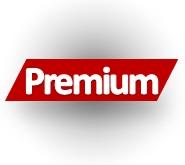
July 29, 2021
Raw Materials Prices: Iron Ore, Coking Coal, Pig Iron, Scrap, Zinc
Written by Brett Linton
Prices for four of the seven steelmaking raw materials tracked in this SMU analysis increased from June to July, with all products following large gains in previous months. Over the last 30 days, coking coal prices increased 16% and busheling scrap prices rose 5%. Zinc and aluminum prices increased less than 1%, while shredded scrap remained flat and pig iron prices declined slightly. Iron ore prices declined 3.5% from late June to today.
Table 1 summarizes the price changes of the seven materials considered in this analysis. It reports the month/month, three months/three months and year/year changes as a percentage.
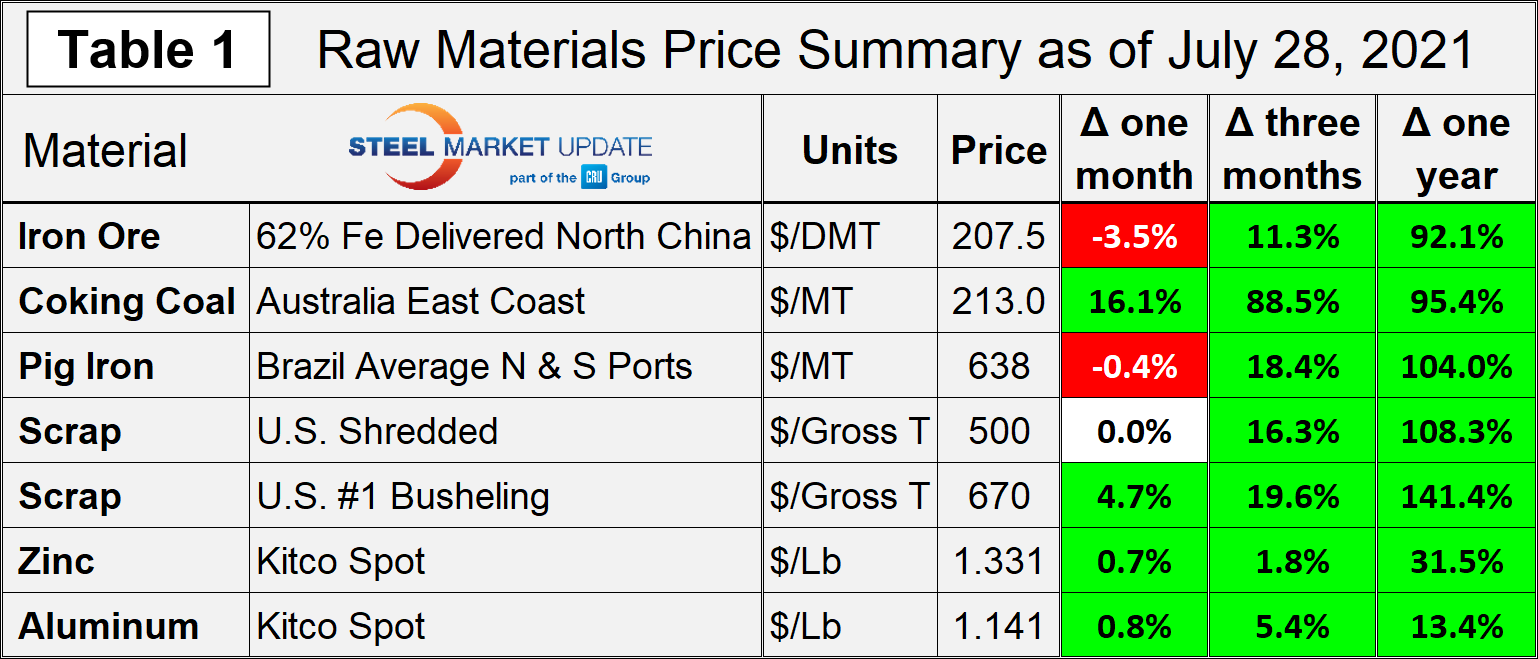
Iron Ore
The Chinese import price of 62% Fe content iron ore fines has been moving upward for over a year, since May 2020. Figure 1 shows the price of 62% Fe delivered North China at $207.5/dmt as of July 28, up 11% over three months prior and nearly double the July 2020 price.

Coking Coal
The price of premium low volatile coking coal FOB east coast of Australia has ramped up since May, surpassing the 2020 high last month and reaching $213.0 per dry metric ton as of July 28 (Figure 2). The last time coking coal prices were this high was in March 2019. Although up over 2020 levels, recent coking coal prices are just now approaching levels seen from approximately 2017 to mid-2019.
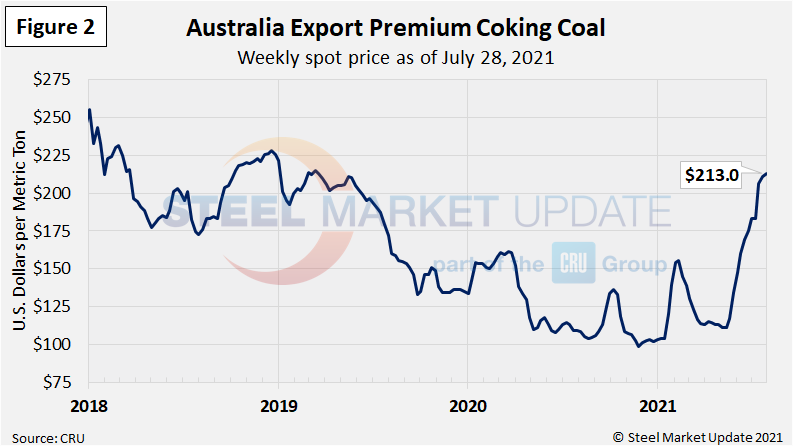
Pig Iron
Most of the pig iron imported to the U.S. currently comes from Russia, Ukraine and Brazil. This report summarizes prices out of Brazil and averages the FOB value from the north and south ports. The latest data through July shows an average pig iron price of $638 per metric ton. Pig iron prices have remained historically high for the past eight months and are up 104% from levels one year ago. Pig iron prices reached a low of $275 per metric ton in May 2020, with prices increasing each month thereafter through January 2021. After February’s slight dip, pig iron prices resumed their upward climb and have remained strong since (Figure 3).
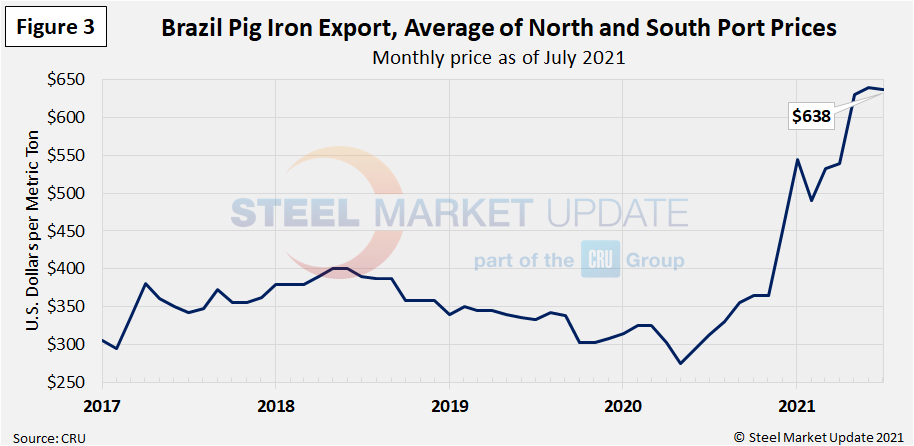
Scrap
Hot rolled steel prices fluctuate up and down with the price the mills must pay for their raw materials. Changes in the relationship between scrap and iron ore prices offer insights into the competitiveness of integrated mills, whose primary feedstock is iron ore, versus the minimills, whose primary feedstock is scrap. Figure 4 shows the spread between shredded and busheling, both priced in dollars per gross ton in the Great Lakes region. July scrap prices remain at historically high levels, up 16-20% compared to three months prior and 108-141% higher than prices one year ago. Prior to 2021, the previous record for scrap prices over the last decade occurred in December 2011 at $510 per ton for busheling scrap, and in February 2012 at $473 for shredded scrap.
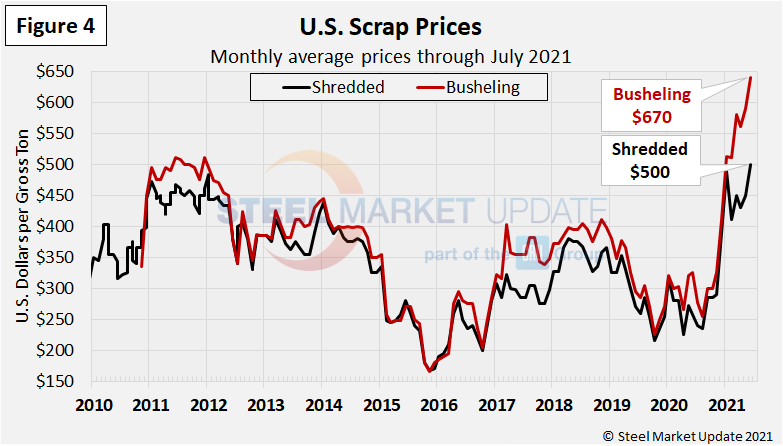
Figure 5 shows the similar uptrend in the prices of mill raw materials over the past year as the price of iron ore surpassed $200 per dry metric ton in May. Shredded scrap reached $500 per gross ton in June and has remained at that level since.

To compare the two, Steel Market Update divides the shredded scrap price by the iron ore price to calculate a ratio (Figure 6). A high ratio favors the integrated/BF producers, a lower ratio favors the minimill/EAF producers. At the current 2.41 ratio shown below, minimills continue to hold a cost advantage. This ratio hit an all-time low of 1.86 in August 2020 (within SMU’s 12-year limited data history).

Figure 7 shows how the price of hot rolled steel generally tracks with the price of busheling scrap. Bush rose by $30 per ton from June to July, up $158 from January. Hot rolled prices continue to rise week after week, with the latest SMU average at $1,860 per ton as of July 27; this is up $90 per ton over the last month, up $850 per ton since the start of the year, and up $1,410 per ton over one year prior.
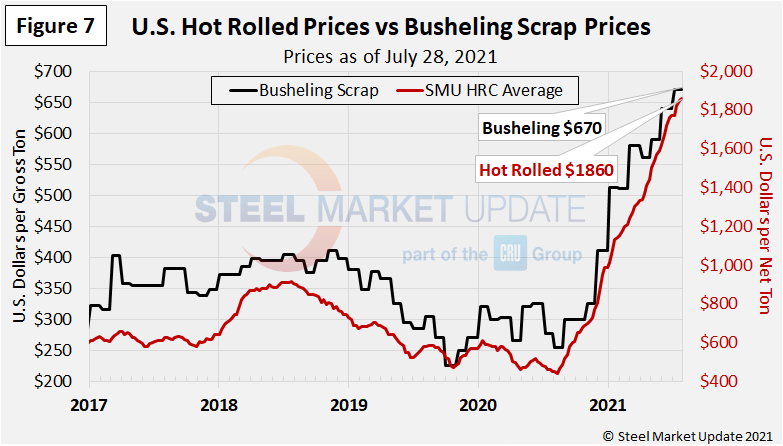
Zinc and Aluminum
Zinc, used to make galvanized and other products, has been on the rise since March 2020 and reached a multi-year high in early-June (Figure 8). The LME cash price for zinc as of July 28 is $1.3305 per pound, down 4% from the June 2 peak of $1.3883. The latest zinc price is up 2% from three months prior, up 32% from one year ago, and up 62% from the March 2020 low of $0.8236. The price of zinc factors into the coating extras charged by the mills for galvanized products.
Aluminum prices, which factor into the price of Galvalume, have been trending upwards since May 2020 and reached a multi-year high in mid-May 2021. Note that aluminum prices often have large swings and return to typical levels within a few days, as seen in the graphic below. We do not consider those surges in our overall high/low comparisons. The LME cash price of aluminum was $1.1410 per pound as of July 28, up 5% over three months ago and up 13% over one year prior.
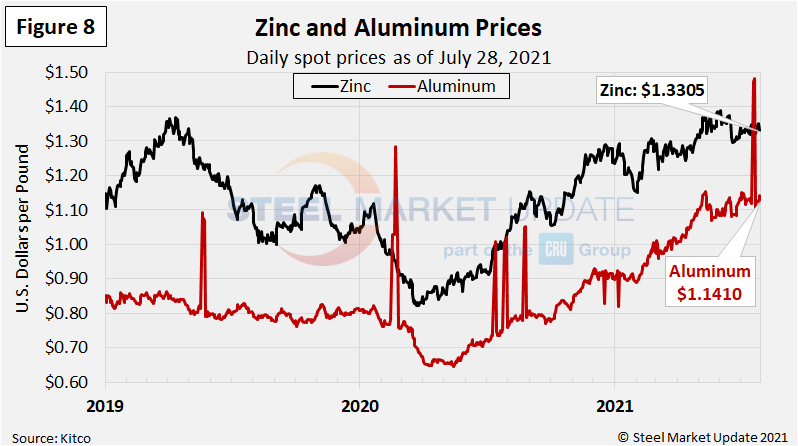
By Brett Linton, Brett@SteelMarketUpdate.com







